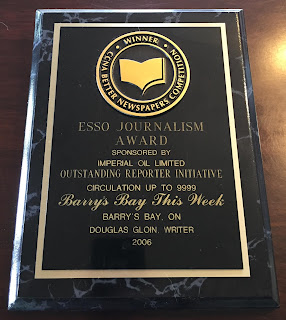Doug and I met online, and spent several weeks writing emails back and forth before we spoke on the phone. My first impression of him was firmly anchored in his his love of words, and his love of writing. Two (of the many!) things we shared in common.
At that time, Doug was running the newspaper in a small town, having retired after almost quarter of century working for the Toronto Star. He was a voracious reader, an excellent writer, and had a phenomenal vocabulary. His Dad, also an Star man, wrote a column about words, and reviewed books, amongst his other positions. Doug spoke of how their house overflowed with advance copies, review copies, books and more books; one of my childhood friends thought I lived in the library . . . and our homes (in the UK and now here) are similarly over-booked. (And yes, every single book in this house ‘sparks joy’ in my life.)
Pre-Covid I had the best summer job - teaching Creative Writing to a group of International students in Cambridge. I loved introducing my students to OuLiPo, the poetics of chance, and Mitch Goldstein’s ‘Ferret-Jello Hypothesis’ (which suggests that we will always try to forge a relationship between two nouns which are linked only through physical proximity to each other, in order to make sense of what we’re hearing or reading) and then playing with writing exercises purported to have been created by a group of Surrealists.
Fun fact: On my Dad’s side of the family, I am distantly related to dictionary writer, Noah Webster. On my Mum’s side of the family, I am less distantly related to dictionary writer, Felix Author Yockney. I grew up in a house where dictionaries were kept in the kitchen (and several other rooms as well), and were consulted multiple times a day, and every room (including the bathroom) had bookshelves. (I'm so lucky to have been brought up in a house where it was so easy to fall in love with reading.)
My heart has broken a million times as I’ve watched Doug lose the ability to read, and lose his nouns, and lose his sentence structure, and lose much of his English. Never blessed with a child to raise, I wonder if his loss of language is a reverse mirroring of the way he learned it. I think about a Linguistics course I audited during my undergrad, and non-verbal communication, and how easy it is, in fact, to carry on both nonsensical conversations and entirely one-sided conversations. And I am very aware that when Doug strings seemingly random words together, I am desperately trying to find a connection, to make them make sense, to listen and to hear and to understand.
(If you didn't know, you might think Doug is reading his mail)
What he has not lost is his gorgeous singing voice (the words don’t matter), and his ability to whistle, and his laughter. Also, he has not lost his love of listening to poetry, and making rhyming words, and the sound of music.
Words still matter. Words still connect us.









No comments:
Post a Comment